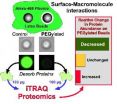(Press-News.org) Recent recommendations from the U.S. Preventive Services Task Force (USPSTF) advising elimination of routine prostate-specific antigen (PSA) screening for prostate cancer in healthy men are likely to encounter serious pushback from primary care physicians, according to results of a survey by Johns Hopkins investigators.
In a survey of 125 primary care doctors, the researchers found that while doctors agreed with older recommendations to curtail routine screening in men over age 75 and among those not expected to live 10 or more years, a large number said they faced significant barriers to stopping PSA testing in men who had been receiving it regularly. The most frequently cited reason by 74.4 percent of physicians was, "My patients expect me to continue getting yearly PSA tests," followed by 66 percent of them who said, "It takes more time to explain why I'm not screening than to just continue screening." More than half of those surveyed in the new study believed that, "By not ordering a PSA, it puts me at risk for malpractice."
The survey was conducted in November 2011, right after draft recommendations were made to end routine screening of all men, but before last week, when the draft recommendations were officially approved.
"It can be very difficult for doctors to break down the belief that all cancer screening tests are invariably good for all people all the time," says Craig E. Pollack, M.D., M.H.S., an assistant professor in the Division of General Internal Medicine at the Johns Hopkins University School of Medicine, and leader of the study published online in the journal Cancer. "Everyone agrees that PSA screening isn't as good as we want it to be. If we had a test that was a slam dunk, it would be different. But now we know that for many men, the benefits may be small and the harms significant."
Each year, more than 33,000 American men die of prostate cancer, and 20 million get the PSA test to detect the disease early.
According to the USPSTF, evidence suggests the potential harms caused by PSA screening of healthy men as a means of identifying prostate cancer outweigh its potential to save lives and that routine annual screening should be eliminated in the healthy. Elevated PSA readings are not necessarily evidence of prostate cancer, and can lead to unnecessary prostate biopsy. In addition, even when biopsies reveal signs of prostate cancer cells, evidence shows that a large proportion will never cause harm, even if left untreated. The disease in older men often progresses slowly so that those who have it frequently die of other causes.
Treatments for prostate cancer can include the removal of the prostate, radiation or other therapies, each of which has the potential to cause serious problems like erectile dysfunction, complete impotence, urinary incontinence or bowel damage. And men who choose to "watch and wait" after elevated PSA readings must live with the anxiety of knowing they have an untreated cancer that could start to progress.
In the new study, Pollack and his colleagues found that while most physicians said they took age and life expectancy into account when deciding to order PSA screening, many also said they had a hard time estimating life expectancy in their patients and could use a better tool. H. Ballentine Carter, M.D., a professor of urology at Johns Hopkins and the senior investigator on the study, is planning to investigate the potential of individualized prostate cancer screening recommendations. Specifically, he and colleagues plan to create a decision-making tool that incorporates age, life expectancy, family history and prior PSA results in order to help doctors and their patients make better choices for prostate cancer screening.
In another report derived from results of Pollack's and Carter's survey, published in April in the Archives of Internal Medicine, the researchers say nearly half of the providers agreed with the new USPSTF recommendations to eliminate routine screening for healthy men. Still, less than two percent said they would no longer order routine PSA screening in response to the draft recommendations; 21.9 percent said they would be much less likely to do so; 38.6 percent said they would be somewhat less likely to do so; and 37.7 percent said they would not change their screening practices.
"Men often expect PSA screening to be part of their annual physical," Pollack says. "To change their minds, we need to address their perceptions about screening, allow time for screening discussions and reduce concerns regarding malpractice litigation."
INFORMATION:
The studies were supported in part by a Maryland Cigarette Restitution Fund Research Grant to Johns Hopkins.
Other Johns Hopkins researchers involved with the studies included Elizabeth A. Platz, Sc.D., M.P.H.; Nrupen A. Bhavsar, Ph.D., M.P.H.; Gary Noronha, M.D.; Gene E. Green, M.D.; and Sean Chen, B.A.
For more information:
http://www.hopkinsmedicine.org/gim/faculty/Pollack.html
END
As part of his commitment to staying current in modern advances and technology associated with sleep apnea effects and treatments, Dr. Joe Serra has attended the new obstructive sleep apnea course offered by LVI Global entitled, LVI Sleep - The Physiologic Approach to Treating OSA. The course is designed to assist dentists, such as Dr. Serra, in learning about the relationships between health, sleep breathing disorders and neuromuscular dentistry. The course teaches dentists to better identify, co-manage and refer patients who are suffering from obstructive sleep apnea ...
The transfusion of red blood cells (RBC) is a critical component in the treatment of a number of acute and chronic medical problems. Indeed, approximately 75 million units of whole blood (~34 million liters) are annually collected worldwide for processing and eventual transfusion. Despite this massive collection effort, the need for blood constantly exceeds availability due to a combination of collection, manufacturing, storage and biological (i.e., immunological) issues. The immunological issues can often be the most clinically vexing as the RBC has ~300 blood group antigens ...
David Perecman and New York construction accident lawyers at The Perecman Firm scored a major victory for an injured construction worker. As importantly, they also advanced the law regarding construction worker protection in their appeal of the Stallone v. Plaza Construction Corp. case (Index No. 105940/08).
The Appellate Division, First Department ruled that the plaintiff should have summary judgment on liability under New York Labor Law 240.
"We are extremely pleased with the court's decision. Protecting the safety of construction workers on the work site ...
Graphene, a stable two-dimensional structure, has attracted tremendous worldwide attention in recent years because of its unique electronic, physical and mechanical properties as well as its wide range of applications. It has been proven experimentally that the electrical properties of graphene are strongly related to its size, geometry, and edge structure. Therefore, controlling graphene to desired edge structures and shapes is required for its practical application. To date, researchers have explored many graphene patterning methods, such as a catalytic cutting [1-4], ...
The Federal Motor Carrier Safety Association (FMCSA) is planning to implement requirements that will require commercial driver's license (CDL) holders with a body mass index of at least 35 to be tested for sleep apnea. This number is based on a recent recommendation from the Medical Review Board. Drivers with a BMI of 35 or greater will be required to undergo an initial sleep apnea screening.
Sleep apnea is a condition where an upper airway narrows or closes during sleep, causing sleeping patterns to be disturbed. Those with sleep apnea tend to be extra sleepy during ...
Based on information compiled by the National Highway Transportation Safety Administration (NHTSA), the American Motorists Association (AMA), and Mothers Against Drunk Driving (MADD), New York has ranked 29th for the worst drivers in the nation.
Separately, these organizations already track which states have the most driver fatalities, the most tickets issued, and the most drunk drivers. Recently, the three organizations combined their efforts to demonstrate which states have the worst drivers.
Data for each state was translated into a ranking in each of the following ...
Scientists have created and imaged the smallest possible five-ringed structure – about 100,000 times thinner than a human hair – and you'll probably recognise its shape.
A collaboration between the Royal Society of Chemistry (RSC), the University of Warwick and IBM Research – Zurich has allowed the scientists to bring a single molecule to life in a picture, using a combination of clever synthetic chemistry and state-of-the-art imaging techniques.
The scientists decided to make and visualise olympicene whose five-ringed structure was entered on ChemSpider, the RSC's ...
EAST LANSING, Mich. — An international research team has manufactured a new protein that can combat deadly flu epidemics.
The paper, featured on the cover of the current issue of Nature Biotechnology, demonstrates ways to use manufactured genes as antivirals, which disable key functions of the flu virus, said Tim Whitehead, assistant professor of chemical engineering and materials science at Michigan State University.
"Our most potent design has proven effective on the vulnerable sites on many pandemic influenza viruses, including several H1N1 (Spanish flu, Swine flu) ...
Hampton Inn Atlanta-Southlake Morrow GA Hotel offers close lodging to family and friends attending upcoming Atlanta Area Suzuki Piano Association (AASPA) Graduation Concerts at Clayton State University's Spivey Hall. The concerts are open to the public and will take place at 1pm and 4pm on June 3, 2012. The graduation program is designed to recognize the accomplishments of dedicated Suzuki students and teachers throughout Georgia.
Marking its 15th year at Spivey Hall, the AASPA graduation concerts promote the education principles set forth by Dr. Suzuki and Dr. Kataoka. ...
The Hilton Garden Inn Hotel in Columbia SC (Northeast) offers convenient accommodations to parents and guests attending upcoming U.S. Army's Basic Combat Training (BCT) Gradation at Fort Jackson on May 31, 2012. The ceremony will take place on Hilton Field at 9:00am. Guests can also attend "Family Day" on May, 30, which allows the family and friends of graduating Soldiers to meet the battalion commander. They can also meet the unit's drill sergeants and observe demonstrations of Soldier skills.
"We are pleased to welcome guests staying at our hotel near ...



